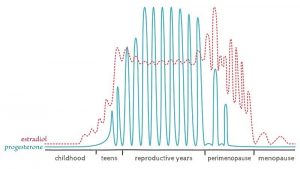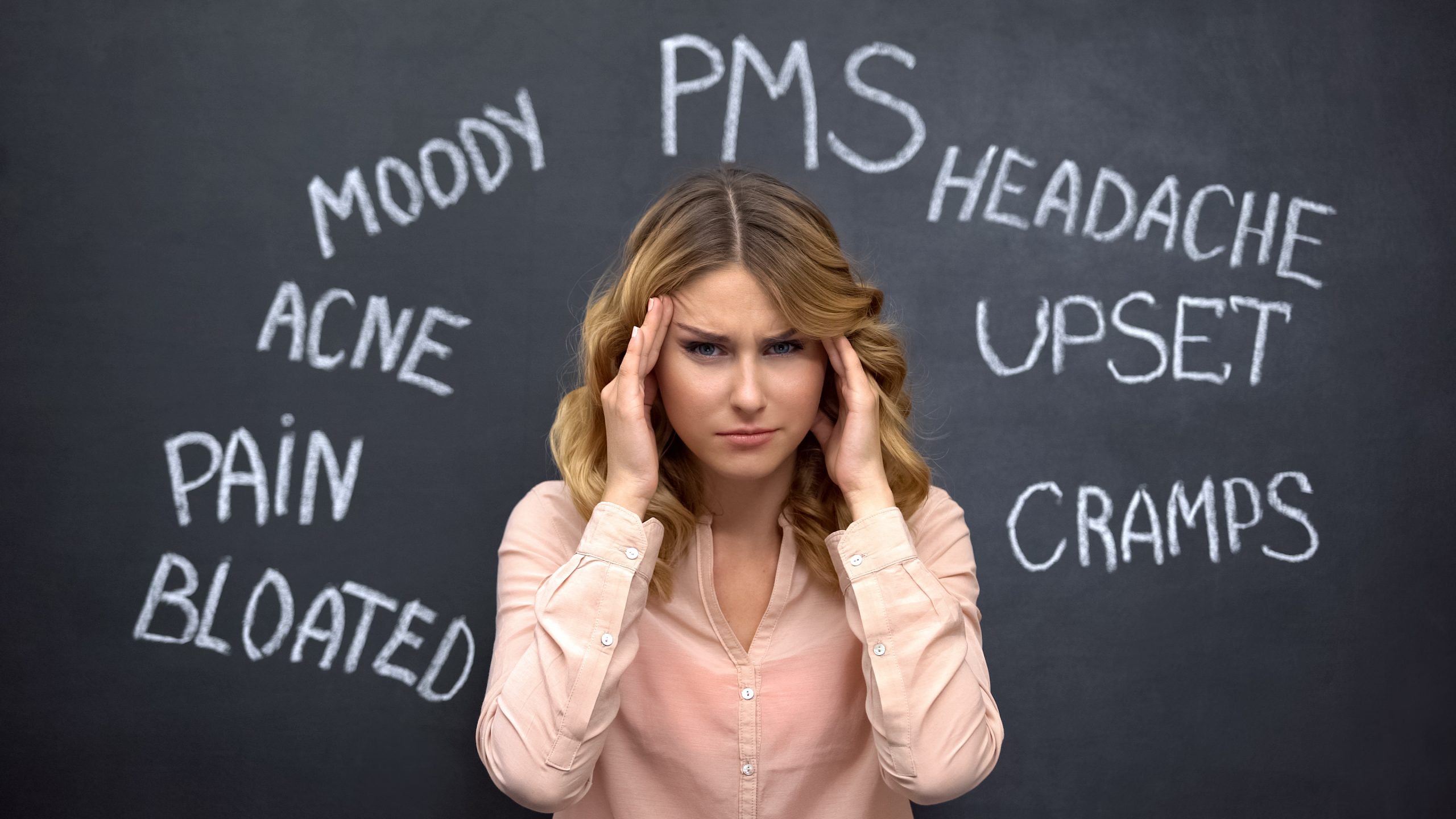You probably know that menopause has something to do with hormones, but do you know what hormonal changes occur around menopause? And how do hormonal changes cause menopausal symptoms exactly?
What happens to your hormones during menopause?
You reach menopause when you haven’t ovulated for 12 months; that is, your ovaries have stopped producing eggs. Most women can recognise this because their periods have stopped. Some may find it harder to tell because they don’t have periods. This may be due to a hysterectomy, endometrial ablation (to stop heavy periods) or use of hormonal treatments like a Mirena IUD. Women who are on the pill or other hormonal contraception which “induces” periods can be mislead into thinking they’re not menopausal.
During your reproductive years ovaries produce estrogen and progesterone in a cyclical manner. Once you stop ovulating at menopause however, your estrogen and progesterone levels are much lower.

Diagram from Lara Briden’s Hormone Repair Manual, adapted from the work of Prof JC Prior.
What happens to your hormones during perimenopause?
As much as ten or twelve years before menopause you can start to experience the effects of subtle hormonal changes starting to occur. This is known as perimenopause. One of the more obvious signs is if you notice some changes in your menstrual cycles. They may become shorter, longer, or less regular in some way.
Early in perimenopause you may experience a relative lowering in your progesterone levels, especially if you “miss” ovulations in some cycles. Later in perimenopause, as you get closer to running out of eggs and becoming menopausal, your estrogen levels will also become much lower at times.
Do bloods tests help diagnose menopause?
Right throughout the perimenopausal years your hormone levels can fluctuate quite wildly from day to day and week to week. At any given time your hormone levels might look perfectly normal and non-menopausal, but a week later might be in the menopausal range. For this reason, blood tests in perimenopause can often be unhelpful or misleading.
If you are unexpectedly young, or trying to work out if you’re menopausal for contraceptive reasons, then sometimes your doctor will need to order some hormonal blood tests.
What symptoms are due to hormonal changes at menopause?
During perimenopause the rapid changes in hormone levels can cause symptoms such as mood changes, sleep disturbance, breast tenderness, migraines and pain. The symptoms may be cyclical with your menstrual pattern.
When progesterone is relatively low compared to estrogen you may start to experience very heavy, and possibly painful periods. This is because estrogen has a thickening effect on the lining of the uterus (the endometrium), which progesterone has a thinning, stabilising effect. If ovulations are erratic then your menstrual bleeds will also be irregular.
When estrogen levels are dropping rapidly or are very low you might start to experience hot flushes and night sweats, two of the “classic” menopausal symptoms. Women often report difficulty with thought processes or memory, “brain fog”, musculoskeletal aches and pains, libido and mood changes, and urinary frequency.
Postmenopausally, when estrogen levels have been low for some time, you may experience thinning and drying of the vaginal tissues. “Vaginal atrophy” as it’s known (awful name!) can make the vaginal tissues prone to damage and pain during intercourse.
Do ovaries still produce hormones after menopause?
Even after menopause the ovaries continue to produce hormones including testosterone that are converted to estrogen in other parts of the body. There are other sources of estrogen in the body too; small amounts are made by the adrenal glands (on the kidneys) and by fat deposits. Progesterone however is only made by the ovaries after ovulations, which cease at menopause. Thus, postmenopausal progesterone levels are persistently low.
Do hormones stabilise after menopause?
Postmenopausally reproductive hormone levels are naturally quite low and stable. The mood instability and cyclical symptoms some women experience in perimenopause may disappear again after menopause.
You may continue to experience hot flushes for some time afterwards however, as your body struggles to adjust to lower estrogen levels. One way to manage hot flushes and night sweats is with estrogen therapy. This is a safe and very effective treatment option for most women who are perimenopausal or recently menopausal.
Can hormone imbalance cause bleeding after menopause?
Estrogen can result in amazing improvement in symptoms and quality of life for women with debilitating hot flushes. If you have a uterus however, estrogen will also stimulate the endometrial lining and potentially cause new bleeding unless it is administered with something else to counteract this effect. Usually this will be either progesterone or a synthetic substitute, to thin and stabilise the endometrium. When provided in combination with estrogen this is known as “Combined MHT” (Menopausal Hormone Therapy).
It is therefore very common that women starting new MHT (or HRT as its also known) will get a change in their bleeding pattern or even postmenopausal bleeding. This is usually a sign that the effects of the estrogen are not quite correctly balanced against the effects of the progestogen. Your menopause doctor will usually be able to suggest changes in your treatment to overcome the problem.
Women who experience vaginal bleeding after menopause should always be reviewed by a doctor for other potential causes however, which could include cervical or endometrial cancer. _______________________________________________________________________________________________________________________________________________
What is WellFemme About?
If you can’t find the professional help you need for your peri/menopausal symptoms then book a Telehealth consultation with an expert WellFemme menopause doctor.
WellFemme is Australia’s first dedicated Telehealth menopause clinic, servicing locations nationwide including: Melbourne, Sydney, Adelaide, Darwin, Perth, Hobart, Brisbane, Dubbo, Bendigo, Broken Hill, Broome, Alice Springs, Launceston, Cairns, Mildura, Lightning Ridge, Kalgoorlie, Albany, Toowoomba, Charleville, Port Headland, Katherine, Ballarat, Coober Pedy, Bourke, Albury… and your place! 
Tags
hormone changes, hormones, hormones in women, menopause, Perimenopause, perimenopause symptoms, what causes menopause symptoms,
